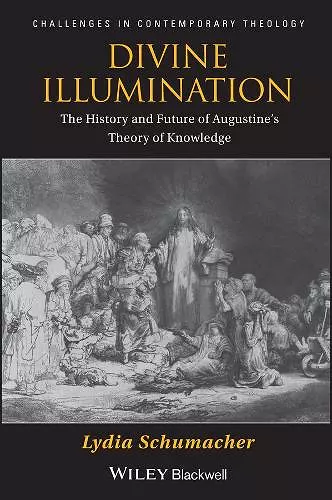Divine Illumination
The History and Future of Augustine's Theory of Knowledge
Format:Hardback
Publisher:John Wiley and Sons Ltd
Published:5th Apr '11
Currently unavailable, our supplier has not provided us a restock date

DIVINE ILLUMINATION
“An important and ground-breaking study which links growing interest in Augustine and medieval philosophy with cutting-edge questions in contemporary philosophy of religion, particularly concerning epistemology and the ‘rationality’ of religion.”
Janet Soskice, University of Cambridge
“In this lucidly argued and solidly documented study, Schumacher uncovers the roots of problems notoriously besetting modern theories of knowledge in conflicting medieval interpretations of Augustine’s assumptions about knowledge as divine illumination: an intriguing thesis, which she handles with delicacy and flair.”
Fergus Kerr, O.P. University of Edinburgh
“Challenges the traditional history of theories of knowledge. A bold and provocative reading.”
Olivier Boulnois, École Pratique des Hautes Études (University of Paris, Sorbonne)
Divine Illumination offers an original interpretation of Augustine’s theory of knowledge, tracing its development in the work of medieval thinkers such as Anselm, Bonaventure, Thomas Aquinas, and John Duns Scotus. Although Scotus is often deemed responsible for finally pronouncing Augustine’s longstanding illumination account untenable, Schumacher shows that he only rejected a version that was the byproduct of a shift in the understanding of illumination and knowledge more generally within the thirteenth-century Franciscan school of thought.
To reckon with the challenges in contemporary thought on knowledge that were partly made possible by this shift, Schumacher recommends relearning a way of thinking about knowledge that was familiar to Augustine and those who worked in continuity with him.
Her book thus anticipates a new approach to dealing with debates in contemporary epistemology, philosophy of religion, and theology, even while correcting some longstanding assumptions about Augustine and his most significant medieval readers.
“Taking Augustine’s Platonism seriously thus affords a better understanding of Augustine’s theory of knowledge than taking either Aristotelian or Avicennan notions of the intellect as normative.” (Scottish Journal of Theology, 1 July 2014)
“Nonetheless, she has written an important and stimulating book.” (Reviews in Religion and Theology, 1 March 2013)
"This volume merits attention from patristic scholars, medievalists, systematic theologians, and philosophers alike." (Religious Studies Review, 1 June 2012)
“Schumacher could very well recommend the epistemological itinerary of the de Trinitate without the challenge of re-writing western intellectual history. I look forward to her next book, which promises to do just that.” (Modern Theology, 1 January 2013)
ISBN: 9780470657423
Dimensions: 238mm x 160mm x 19mm
Weight: 531g
264 pages